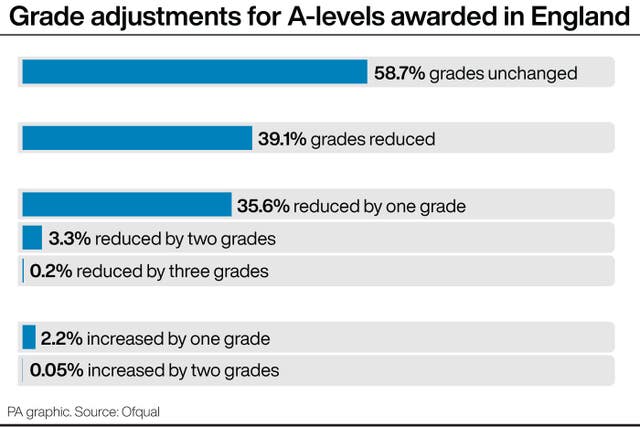Boris Johnson is facing a Tory backlash over the deepening A-levels crisis in England as pupils and teachers continued to protest about the results awarded.
Senior Conservatives called for the government to resolve the “shambles” which had been “terribly unfair” to students who got lower-than-expected grades after their exams were cancelled as a result of coronavirus.
Johnson is expected to go on holiday to Scotland this week, but Labour leader Keir Starmer called on him to take “personal responsibility” in dealing with the situation.
The Conservative former education secretary Kenneth Baker urged ministers to delay the publication of GCSE results, due on Thursday, until the problems with A-levels had been resolved.
Fears about a repeat of the chaos heightened pressure on Johnson and education secretary Gavin Williamson from within the Tory ranks.
Former leader Iain Duncan Smith said a combination of teacher assessments and mocks should be used for grades, with the controversial algorithm – meant to standardise results – abandoned.
“No algorithm is going to sort our problem out,” he told LBC Radio.
Ex-minister Stephen Hammond said the A-level process had turned into a “shambles” after regulator Ofqual published its guidance on appeals over the weekend only to withdraw the document hours later.
“This is not the actions of a body that seems to know what it is doing,” he told Sky News.
Poole MP Robert Syms said “if you have a computer system, as we have at the moment, adjusting grades, I just think it is terribly unfair” and suggested using schools’ assessments, even if that meant grade inflation.
He told Times Radio: “If the government want to get out of this problem, the simplest solution is to accept grade inflation.”
The Department for Education (DfE) has said it is continuing to work with Ofqual to build as much “fairness into the appeals process as possible” to help what it described as the “most difficult cases”.
“Ofqual continues to consider how to best deliver the appeals process to give schools and pupils the clarity they need,” a DfE spokesperson said in a statement issued late on Sunday.
No explanation was given for the withdrawn Ofqual guidance, although Labour said that it undermined assurances given to pupils by the education secretary about the appeals process.

Williamson last week gave a “triple-lock” commitment that pupils could use the highest result out of their teacher’s predicted grade, their mock exam, or sitting an actual exam in the autumn.
But the Ofqual guidance said if the mock result was higher than the teacher’s prediction, it was the teacher’s prediction that would count.
In a further setback for the education secretary, the Daily Telegraph reported that some members of the Ofqual board now wanted to ditch the system for “moderating” the predicted grades awarded by teachers so results are standardised across the country.
Williamson has consistently argued moderation was essential to prevent “rampant grade inflation” and insists there can be no U-turn.
However, critics have complained the algorithm penalised bright pupils in schools in more disadvantaged areas, while benefiting those in private schools.
The Telegraph said some Ofqual board members believed it had resulted in a “haemorrhaging” of public trust in the results, and reverting to teacher assessments – as the Scottish government had done – may be the “least bad option”.
In the north of Ireland, education minister Peter Weir has said GCSE students will be awarded the grades predicted by their teachers.
Weeks of chaos, confusion and incompetence.
We need a return to teacher assessments for A-level results and urgent action to avoid the same injustice for GCSE students.
Boris Johnson has been invisible during this crisis. He needs to take personal responsibility, and fix it.
— Keir Starmer (@Keir_Starmer) August 16, 2020
Those concerns are likely to strengthen the hands of teaching unions who are pressing for teacher assessments as the only fair way forward.
The Sixth Form Colleges Association analysed 65,000 exam entries in 41 A-level subjects and found the grades awarded to students this year were lower in all of them than they were for the average of the previous three years.
On average, almost a fifth of students (19%) in sixth form colleges have been left with lower grades than they would have received if they had sat their exams in previous years, the research found.
The association’s chief executive Bill Watkin said: “Ofqual should therefore immediately recalibrate and rerun the model to provide all students with an accurate grade, and provide an assurance that this will be no lower than the calculated grade they have already received.
“Should this still fail to produce results that are broadly similar to previous years, students should be awarded the grades predicted by teachers.”
So it looks like the Government ARE digging in and standing by their deeply flawed system.
In that case, I will be taking legal advice this morning and have instructed leading Counsel. I expect to be writing to @ofqual later today to initiate action. https://t.co/PJp3PW9Hyi
— Andy Burnham (@AndyBurnhamGM) August 17, 2020
The government could face a legal challenge over the situation, with Greater Manchester’s mayor Andy Burnham instructing lawyers.
“I will be taking legal advice this morning and have instructed leading counsel,” he said. “I expect to be writing to Ofqual later today to initiate action.”
Am sure @halfon4harlowMP and @CommonsEd will lead on inquiry into A Level debacle, but this has exclusively impacted young people and of course age is a protected characteristic. As Chair of @Commonswomequ am keen to support.
— Caroline Nokes MP (@carolinenokes) August 17, 2020
Tory MP Caroline Nokes, who chairs the Commons Women and Equalities Committee, said the row affected young people – pointing out that age is a protected characteristic in anti-discrimination law.
“This has exclusively impacted young people and of course age is a protected characteristic,” she said and promised to support any inquiry into the fiasco.


















